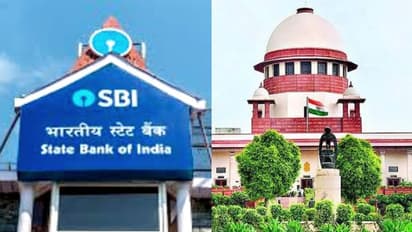'What steps have you taken in 26 days?': Supreme Court pulls up SBI on electoral bonds

Synopsis
The Supreme Court on Monday heard the State Bank of India’s request seeking an extension till June 30 to disclose details of each electoral bond encashed by political parties before the scheme was scrapped last month.
The Supreme Court on Monday came down heavily on the State Bank of India (SBI) for not complying with its order and not disclosing electoral bond donor details to the Election Commission of India (EC) by March 6.The lender filed a petition asking for an extension of time to provide the EC with information on all electoral bond purchases made since April 12, 2019, when the top court made its incisive observations.
Senior advocate Harish Salve appearing for the SBI told the apex Court that the bank needs extra time to submit details of Electoral Bonds to the Election Commission of India.
“In the last 26 days, how much of matching has been done,” asked the court. "We have asked you to do plain disclosure as per our judgment. In the last 26 days, what steps have you taken? Your application is silent on that," the apex court asked SBI on electoral bonds.
"It's a serious matter when you come up with extension like this. Our judgement was crystal clear," said Justice Sanjiv Khanna.
According to the court, the bank only needs to open a sealed cover, gather information, and provide it to the Election Commission. The Supreme Court informed SBI that it had ordered a simple disclosure and had not requested that the bank complete the matching procedure in its ruling.
The case was heard by a five-judge panel that included Justices Sanjiv Khanna, BR Gavai, JB Pardiwala, Manoj Misra in addition to Chief Justice of India (CJI) DY Chandrachud.
The Supreme Court declared the electoral bond scheme illegal on February 15. It instructed the SBI to provide the EC with information on every electoral bond acquisition made from April 12, 2019, by March 6. It further mandated that by March 13, this data be posted on the EC website.
On March 4, however, SBI requested an extension from the Court, pointing out that the procedure was "time-consuming" because of the contributors' confidentiality rules. The ADR’s contempt petition termed the SBI’s plea for extension as "mala fide" and accused the bank of deliberately delaying disclosure to shield donor identities before the upcoming Lok Sabha elections
Stay updated with the Breaking News Today and Latest News from across India and around the world. Get real-time updates, in-depth analysis, and comprehensive coverage of India News, World News, Indian Defence News, Kerala News, and Karnataka News. From politics to current affairs, follow every major story as it unfolds. Get real-time updates from IMD on major cities weather forecasts, including Rain alerts, Cyclone warnings, and temperature trends. Download the Asianet News Official App from the Android Play Store and iPhone App Store for accurate and timely news updates anytime, anywhere.